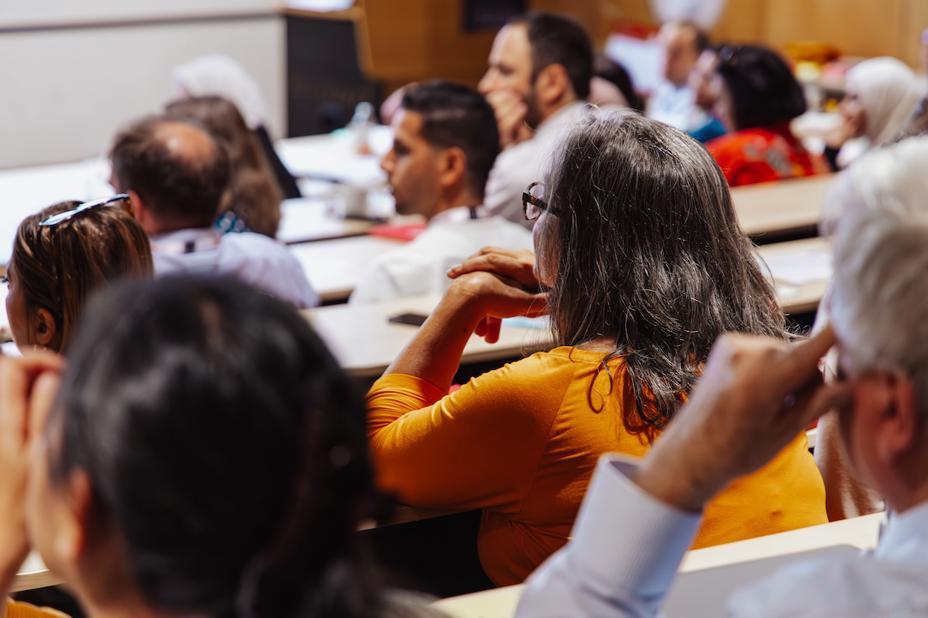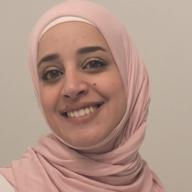
Something went Wrong
Try entering your email again or contact us at support@qfi.org
Try entering your email again or contact us at support@qfi.org
You’ll receive an email with a confirmation link soon.
Sep 3, 2025
By Hind Haddad
As an Arabic language educator with deep roots in the classroom and an academic researcher invested in policy and practice, I’ve often found myself navigating two distinct worlds. Researchers talk in theories, data sets, and discussion sections. Educators talk in lesson plans, classroom behavior, and last-minute curriculum tweaks. But rarely do these worlds sit at the same table and talk to one another.
That’s why this forum meant so much to me.
QFI didn’t just bring together scholars for another academic gathering. They brought together passionate people—teachers, researchers, program coordinators, and community advocates—who are deeply invested in the future of Arabic education. It was a space where both experience and evidence mattered. And it left me hopeful for what’s possible when we stop separating research from practice.
When Passion Meets Purpose
I’ve seen both sides of the equation. I’ve spent hours running analyses on SPSS and nights revising literature reviews. But I’ve also spent early mornings scrambling to adjust lesson plans, helping students code-switch between dialects, and navigating the cultural sensitivities that come with teaching Arabic in a U.S. classroom.
In the research world, we often speak with precision. We agonize over word choice in our conclusions. We cite endlessly. But when I’m in the classroom, my language changes—I speak with urgency, compassion, and improvisation. So I ask myself: Why are we still expecting teachers to be the ones to “translate” research into practice?
At the forum, I saw the beginning of what real partnership could look like. Panels like the Teach Panel created space for educators to reflect, share, and question. I deeply appreciated their stories, but I also found myself wondering: how are these teachers being supported to incorporate research into their practice? Are we asking them to read dense articles with complex charts and APA citations after a full day of teaching?
I don’t think we should.
Let’s Rethink What “Research-Informed” Really Means
Teachers are not lacking curiosity. They are not disconnected from innovation. What they’re lacking is time—and often, access. Many Arabic teachers are balancing full course loads, curriculum modifications, and—let’s not forget—their own families and personal lives that start after school hours.
Being a research-informed teacher shouldn’t mean earning another degree or subscribing to multiple journals. It could mean:
Stanovich and Stanovich (2003) explain that teachers who engage in educational research gain clarity and confidence in their instructional decisions. But they can only engage if the research is accessible, relevant, and respectful of their context. Walsh and Cutler (2021) affirm that “teachers value research evidence, but are hungry for professional development,” highlighting the real need for accessible, targeted, and context-aware learning opportunities.
QFI’s Model: A Blueprint for the Field
What QFI has done by hosting this mixed-career forum is more than just thoughtful—it’s strategic. It’s a model that should be replicated across languages and disciplines. Because when researchers and practitioners sit in the same room, we start speaking a shared language—one built on respect, humility, and action.
I’ve attended too many conferences where teachers are simply the audience. This forum was different. Here, teacher voices were central—not because they were invited, but because they were valued.
I left Oxford with new ideas and new collaborators, but more importantly, I left with a renewed sense of purpose. Arabic language education doesn’t need to be stuck in either theory or practice. We can have both. We must have both.
Moving Forward: From Forum to Future
This forum wasn’t an endpoint—it was the beginning. It reminded me that my dual identity as a teacher and researcher isn’t a burden. It’s a bridge.
So, here’s my call: Let’s continue to create spaces where teachers don’t have to choose between being practical or being scholarly. Let’s design professional learning that meets them where they are. Let’s make research a resource, not a requirement. And let’s ensure that every educator—whether in a rural U.S. school or a bustling Middle Eastern city—feels seen, supported, and inspired by the research that’s supposed to help them.
QFI has modeled what’s possible. Now it’s up to all of us to keep building the bridge.
Disclaimer: The views and opinions expressed in this blog are those of the author and do not necessarily reflect the views of Qatar Foundation International (QFI). While QFI reviews guest contributions for clarity and to ensure the content is valuable for our audience, the accuracy and completeness of the information are the responsibility of the author.
Submit Your Own Blog!
We invite educators, researchers, and professionals in Arabic education to share their insights with our global community. Whether you teach, conduct research, or support Arabic language learning, your voice can spark innovation, drive change, and deepen understanding in the field of Arabic education.
Hind Haddad is an Arabic language educator and researcher with over 15 years of experience in K–12 and higher education. She currently teaches Arabic at Denison University and is pursuing a Ph.D. in Higher Education and Student Affairs at The Ohio State University. Her work focuses on bridging research and practice to support culturally responsive Arabic language instruction.
References
Walsh, L., & Cutler, B. (2021, September 20). Quality classroom teachers are hungry for professional development. The Educator K–12. Retrieved from https://www.theeducatoronline.com/k12/news/quality-classroom-teachers-are-hungry-for-professional-development/278728
Stanovich, P. J., & Stanovich, K. E. (2003). Using research and reason in education: How teachers can use scientifically based research to make curricular & instructional decisions. National Institute for Literacy. https://lincs.ed.gov/publications/pdf/Stanovich_Color.pdf



